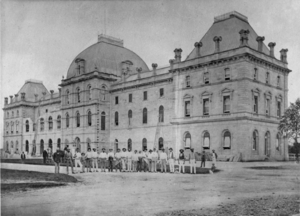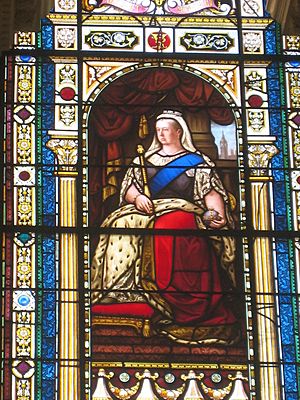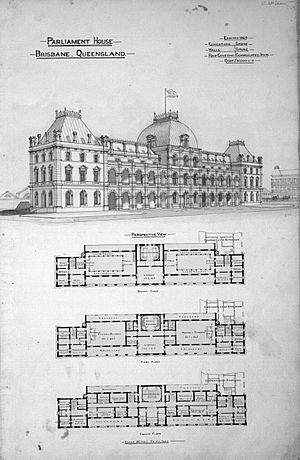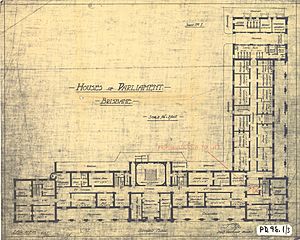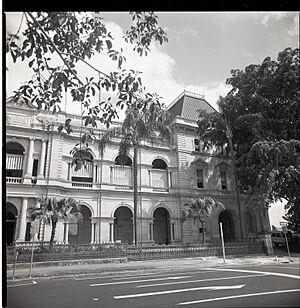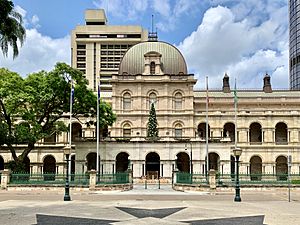Parliament House, Brisbane facts for kids
Quick facts for kids Parliament House |
|
|---|---|
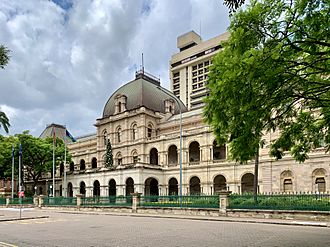
Parliament House with the 1970s brutalist-style Parliamentary Annexe in the background
|
|
| General information | |
| Architectural style | French Renaissance Revival |
| Location | Gardens Point, Brisbane |
| Address | Cnr George Street and Alice Street, Brisbane City, Queensland |
| Construction started | 14 July 1865 |
| Completed |
|
| Opened | 4 August 1868 |
| Cost | |
| Owner | Queensland Government |
| Technical details | |
| Material | Woogaroo sandstone |
| Design and construction | |
| Architect | Charles Tiffin |
Parliament House in Brisbane is where the Parliament of Queensland meets. It's like the main office for the state government! This important building holds the Legislative Assembly, which is the only group of lawmakers in Queensland. You can find it in the heart of Brisbane City, right next to the Queensland University of Technology and the beautiful City Botanic Gardens. It's such a special place that it was added to the Queensland Heritage Register in 1992.
Contents
History of Parliament House
Parliament House has a long and interesting story, starting way back in the 1860s. It's been the center of Queensland's government for over 150 years!
Planning the New Building
When Queensland first became its own colony in 1859, the Parliament met in an old convict barracks. Everyone agreed this wasn't a good long-term home for the government. So, after building a new Government House, they started planning a proper Parliament House.
In 1863, a special group chose the perfect spot for the new building. They held a competition for architects across Australia to design it. The winner would get a prize! A design by Benjamin Backhouse was chosen first, but it was too expensive. Later, Charles Tiffin, who was the main government architect for Queensland, had his plans selected. There were some disagreements about how the design was chosen, but Tiffin generously gave his prize money to a school.
Building Parliament House
The first stone for Parliament House was laid on July 14, 1865, by Sir George Bowen, who was the Governor at the time. A builder named Joshua Jeays used sandstone from his own quarries to construct it. Beautiful stained glass windows, showing royalty, were brought all the way from England.
The first part of the building was finished in 1867. The side facing George Street was completed in 1868. It was designed in a fancy style called French Renaissance Revival. Later, more parts were added, including the archways and columns in 1878. The side facing Alice Street was finished in 1889.
In 1886, Parliament House became the first parliament building in Australia to have electricity! This was a big deal back then.
Parliament House in the 1900s
Many important events happened at Parliament House in the 20th century. In 1922, Prince Alfred visited and planted two trees at the entrance.
In 1939, a group called the League for Social Justice marched to Parliament House. They were protesting about people not having jobs. They even interrupted a meeting inside the building. Many people were charged, but a jury later found them not guilty.
By the late 1960s, Parliament House needed more space. So, they decided to build an extension. This new part, called the Parliamentary Annexe, was designed in a modern style. It was finished in 1979 and cost a lot of money. The Annexe is connected to the original Parliament House, creating a courtyard known as Speaker's Green. This area is used for special ceremonies. The Annexe provides offices for politicians and even rooms for those who travel from far away to attend Parliament. The Annexe has been updated several times, most recently from 2022 to 2024.
Building Design
The George Street side of Parliament House has a grand entrance where carriages used to pull up. Above it is a balcony with a decorative railing. The original roof was made of zinc and iron, but in the 1980s, it was replaced with a copper roof from Mount Isa.
Visiting Parliament House
You can visit Parliament House and see where important decisions are made! Art shows and other displays are often held in the Annexe.
Free guided tours are available every weekday, where you can learn all about the building and how Parliament works. There's also a gift shop where you can buy souvenirs.
Parliament House has even been used as a filming location for TV shows! It appeared in the 1980s Australian series of Mission: Impossible, the 2022 TV series Joe vs. Carole, and the 2024 Disney+ series Nautilus.
Images for kids
See also
 In Spanish: Cámara del Parlamento de Queensland para niños
In Spanish: Cámara del Parlamento de Queensland para niños


